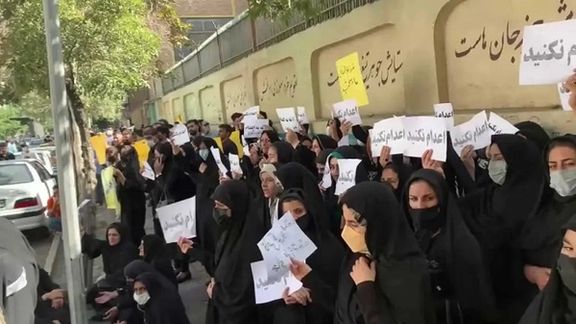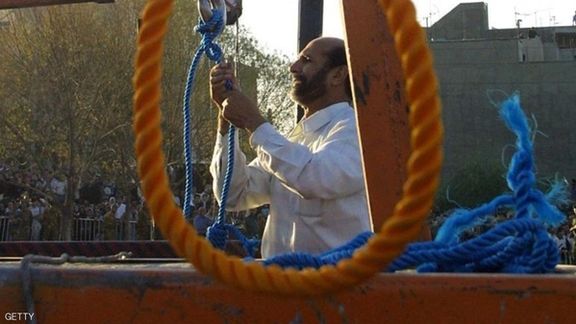Iranian Security Threatens Families Of Death Row Prisoners

Informed sources told Iran International that Iran's security forces have threatened detained relatives of death row prisoners with prosecution if they protest.

Informed sources told Iran International that Iran's security forces have threatened detained relatives of death row prisoners with prosecution if they protest.
Family members of someprisoners sentenced to death held protest rallies outside the building of the Iranian judiciary for nearly a week but on Saturday and Sunday security forces and plainclothesmen attacked them to end their protest.
At least twenty protesters were arrested, and some were beaten so badly that they had to be taken to hospital for treatment, according to information received by Iran International.
Informed sources say some of the detainees have been forced to sign written pledges promising not to take part in protests and have also been threatened that they will be charged with “assembly and collusion against the regime”, “disturbing public order”, and “insulting top officials” and prosecuted, that can carry long prison terms.
Detainees have also been warned not to speak with foreign-based Persian language media, which authorities always refer to as “hostile media”.
One of the parents of a death row prisoner told Iran International that intelligence agents threatened him with the arrest of his other children and their persecution for participation in the protests although his other children were never involved.
Videos posted on social media last week showed protesters including some children holding placards with words ‘No to Execution’ and ‘No Execution for Drugs’ and chanting ‘Don’t Execute’.

“I stand in solidarity with anguished relatives of death row prisoners in Iran who are protesting bravely to stop the execution of their loved ones. Iran’s authorities must abolish the death penalty, which is the ultimate cruel and inhumane punishment,” Agnes Callamard, secretary general of Amnesty International and former UN Special Rapporteur on Extra-Judicial Executions (2016-2021) tweeted Monday with the Persian hashtags ‘No to Execution’ and ‘Don’t Execute’.
The Islamic Penal Code of 2013 provides for the death penalty for a wide range of offences including murder, drug trafficking, adultery, and homosexuality as well as political crimes.
Most of those executed in Iranian prisons are convicted for drug trafficking or murder but anti-death-penalty activists say the regime uses executions as a political tool of intimidation, especially at times of political crisis.
“There are extensive, vague and arbitrary grounds in Iran for imposing the death sentence, which quickly can turn this punishment into a political tool,” Javaid Rehman, UN Special Rapporteur on the situation of human rights in the Islamic Republic of Iran, told the UN General Assembly in delivering his fourth annual report in July 2020.
“In addition, the structural flaws of the justice system are so deep and at odds with the notion of rule of law that one can barely speak of a justice system,” he said. “The entrenched flaws in law and in the administration of the death penalty in Iran mean that most, if not all, executions are an arbitrary deprivation of life,” Rehman said.
The number of executions has considerably increased in the past few months with most probably hundreds of executions not officially announced.
The US-based HRANA, the news agency of Human Rights Activists, on Monday reported a spate of executions in various prisons across the country in the past few days.
The judiciary this month sentenced two female LGBTQ rights defenders, Elham Chubdar and Zahra Sedighi Hamedani, to death for “promoting homosexuality”.
EU Foreign Policy Chief Josep Borrell’s spokesperson Peter Stano on Tuesday condemned the death sentences passed on LGBTQ activists. "The EU is fundamentally opposed to death penalty at all times and in all circumstances and aims at its universal abolition," he said adding that the EU is also firmly opposed to all forms of criminalization of sexual orientation and gender identity.